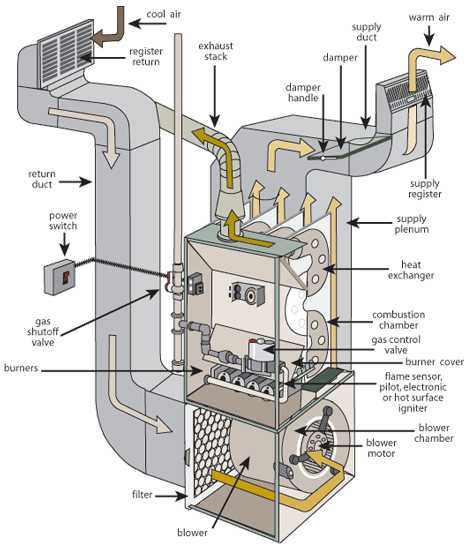
WHAT IS HVAC?
The only solution for your home
In choosing any type of HVAC system, finding one that is size-appropriate to the building is important in terms of achieving the best efficiency and comfort level. Beyond understanding the maintenance and installation of the systems themselves, sizing the systems appropriately is perhaps one of the most difficult tasks of an HVAC contractor. If your HVAC contractor recommends a heating system that is too big or too little for your home or business, the result will be an inefficient system that will cost more money in the long run.
HVAC refers to the different systems used for moving air between indoor and outdoor areas, along with heating and cooling both residential and commercial buildings. They are the systems that keep you warm and cozy in the winter and feeling cool and fresh in the summer. They also are the systems that filter and clean indoor air to keep you healthy and maintain humidity levels at optimal comfort levels. It achieves this by controlling the temperature of a room through heating and cooling. It also controls the humidity level in that environment by controlling the movement and distribution of air inside the room. The system also ensures cleanliness of air inside the said environment.
Brands we service
VTM provides servicing for all the mentioned brand names below, if you have any system listed in our product section and is one of the brand names listed here. Please contact us for a free quote on a professional service of your product.
Improve air quality in your home
How Indoor Air Quality Affects Your Health
Mold, pollen and pet dander are common pollution sources in your house. Other supplies include household cleaners and volatile organic compounds (VOCs). VOCs can be expelled by products in your home, such as building materials, flooring or furniture. They can also be found in numerous air fresheners and scented candles. High VOCs can result in respiratory irritation, headaches and dizziness, among other symptoms.
Many scientific studies have learned respiratory diseases, asthma and other health problems are linked to poor indoor air quality. Allergies can also be triggered by indoor air quality issues.

10 Signs Your Home has Poor Indoor Air Quality
If your family has symptoms that worsen at home and get better when you leave, you may be affected by indoor pollution. You should also talk to your doctor if you’re worried about your health.
- Persistent cold or flu symptoms. A sore throat or runny nose that never improves could be connected to air quality. This is especially true if you feel better when you leave your home.
- Watery, itchy or dry eyes. Your eyes are susceptible to indoor pollution and may react by growing dry, itchy or watery.
- Tiredness or feeling dizzy. Breathing in chemical pollutants can affect your energy levels.
- Frequent asthma attacks. Dust, pet dander, smoke and other triggers can be diffused through the air or get stuck in carpet.
- Coughing and sneezing. Allergies or colds can cause these symptoms, but they shouldn’t be worse at home.
- Excessive dust despite regular cleaning. You may need to get a new air filter or get a filtration system from Service Experts Heating & Air Conditioning.
- Humidity problems. Dryness can cause itchy eyes and increase respiratory problems. Too much moisture can result in mold or mildew growth.
- Musty odors. Mold or mildew blossoms when the humidity in your home is too high.
- Hot or cold spots. This can be related to air quality, especially if your HVAC system is having issues controlling temperature and humidity.
- Nausea. This can be a response to the chemicals or pollutants in your home. It can also be a indication of high carbon monoxide levels. Ensure that you have a operating carbon monoxide detector in your home.
Testimonial
What's Our Client Say

Justin & Kristina
New home ownersWe are new home owners and the house we purchased was older and needed some work besides general renovations we needed and whole new heater and air conditioning system put it as well as new ducts throughout the whole house. Mike at VTM came in and assess the whole house and created a complete package for us from top to bottom with different options that can be done at different times based on the current season. Great work and customer service!

Lisa
Small Business OwnerWe needed a whole new air conditioning system put into our cafe. We were refereed to VTM through a friend and myself and even the landlord could not be happier with the system VTM put into our cafe. Not only is it silent, Mike at VTM put in these special filters to help clean the air and keep it clean as we get a lot of dust coming in from the street level. Thanks Mike. I will definitely pass on you as a referral myself.

Dusty
Work Working Shop OwnerI needed the right man for the job and Mike at VTM came through. My wood working shop has a lot of dust and wood shaving flying around constantly. I need heat with ventilation for the winter and air conditioning with ventilation in the summer. VTM had the right solution for all seasons and did force it to get everything done at once, we worked together for about a year through each season to make sure the right system was put it. Amazing job!

Luna Stuart
Interior DesignerMike was the best in supporting what i wanted to do in my house. I had a vision and he made it happen with both with my new air conditioning system that looks modern on the outside and works wonders on the inside.


